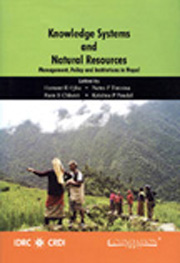Book contents
- Frontmatter
- Contents
- Preface
- Abbreviations
- Glossary of Nepali Words
- 1 Knowledge Systems and Deliberative Interface in Natural Resource Governance: An Overiew
- 2 Agricultural Technology Development in Nepal: Critical Assessment from Knowledge System Perspective
- 3 Contested Knowledge and Reconciliation in Nepal's Community Forestry: A Case of Forest Inventory Policy
- 4 From Grassroots to Policy Deliberation: The Case of Community Forest Users' Federation in Nepal
- 5 From Isolation to Interaction: Increasing Knowledge Interface in Chhattis Mauja Irrigation system in Nepal
- 6 Action Research Experience on Democratising Knowledge in Community Forestry in Nepal
- 7 Culturally Embedded Knowledge in Irrigation: People's Ways of Thriving in a Himalayan Village
- 8 Deliberative Knowledge Interface: Lessons and Policy Implications
- About the Contributors
7 - Culturally Embedded Knowledge in Irrigation: People's Ways of Thriving in a Himalayan Village
Published online by Cambridge University Press: 26 October 2011
- Frontmatter
- Contents
- Preface
- Abbreviations
- Glossary of Nepali Words
- 1 Knowledge Systems and Deliberative Interface in Natural Resource Governance: An Overiew
- 2 Agricultural Technology Development in Nepal: Critical Assessment from Knowledge System Perspective
- 3 Contested Knowledge and Reconciliation in Nepal's Community Forestry: A Case of Forest Inventory Policy
- 4 From Grassroots to Policy Deliberation: The Case of Community Forest Users' Federation in Nepal
- 5 From Isolation to Interaction: Increasing Knowledge Interface in Chhattis Mauja Irrigation system in Nepal
- 6 Action Research Experience on Democratising Knowledge in Community Forestry in Nepal
- 7 Culturally Embedded Knowledge in Irrigation: People's Ways of Thriving in a Himalayan Village
- 8 Deliberative Knowledge Interface: Lessons and Policy Implications
- About the Contributors
Summary
Introduction
In most parts of Nepal today local communities are recognised as the key stakeholders in the conservation and development initiatives and outcomes in relation to natural resource management including water and forests. The local communities which are recognised as Users Groups have been instrumental in managing such resources either through an indigenous and/or traditional management system or through their involvement in externally sponsored initiatives. Irrespective of the type of system in place for the management and development of natural resources, local communities have demonstrated by means of their efforts that combining local knowledge and initiatives with external knowledge and inputs can be beneficial for all (for illustrations see Fisher 1989; Chhetri 1993; Chhetri and Pandey 1992). By now, local communities or Users Groups have gained fame as extremely competent and knowledgeable managers of natural resources.
Locally gained (through an iterative learning process) and shared knowledge about natural resources, environmental and climatic features, etc., have allowed many communities in Nepal to thrive in all kinds of geographical locations including the Himalayan regions. The Loba of upper Mustang are one such people. This paper, based on a study in Lo Manthang examines how the Loba people have managed water and other critical resources essential for making a living in a high altitude desertlike area lying behind the Annapurna and Dhaulagiri Himalayan ranges in north-western Nepal. Since the area lies in the rain shadow, managing water from the snow-fed streams (coming down from the surrounding mountains) for various purposes is of critical importance for the survival of local people.
- Type
- Chapter
- Information
- Knowledge Systems and Natural ResourcesManagement, Policy, and Institutions in Nepal, pp. 135 - 154Publisher: Foundation BooksPrint publication year: 2007
- 1
- Cited by

